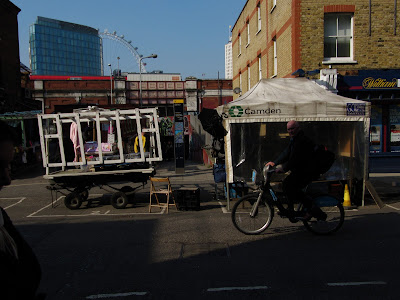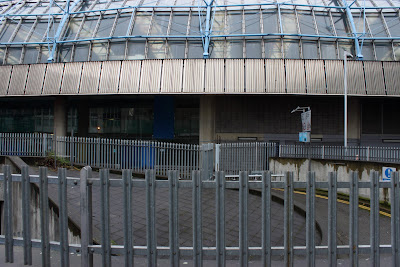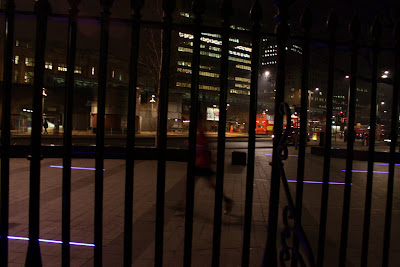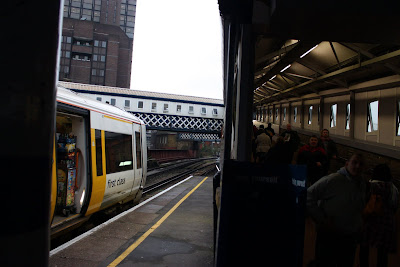A Lower Marsh Air by The London Archaeologist



You do realise, when you meet a person, you know nothing about them beyond the minimum, which will anyway probably turn out wrong?


I look around me at the basement of the bookshop, Lower Marsh, which has the signs, I realise, of being Graham Gibberd’s study. The place could not be as damp as the bare brick walls, the small, high up window of the sunken room had led me to believe: from a system of lines strung across near the ceiling hang reproductions, perhaps, beautifully produced, but I suspect also some original prints of historic London maps and views, many with colouring; the walls are lined with books, what would look like a full set of the multi-volume Survey of London among them, were a definitive account of such depth ever achievable during an evolving city’s life. On the table we sit at – strangely large, it now occurs to me, for the room, blocking off the whole back wall and coming almost to the front, leaving mere passages either side – two what I take to be sculptures, perhaps unfinished, modernist frames climbing.


Someone you’ve spent endless hours with at the pub, he continues, discussing every subject under the sun, turns out to be a surgeon, for instance, and you never realised. Or somebody has a beard, and you see them and you think yes, I know, he has a beard for effect, but perhaps he’s always looked like that.


He looks hard at me, and I nod, waiting for him to go on. In some way he’s resisting me, but I’m not sure how, wait to hear where the point of this will arrive.

Anyway, we don’t meet people because we want to, but because we have to. Perhaps they’re in front of you in the queue for the bus, or you have to ask them something, and that’s how you meet, for instance the man who might be a surgeon, or has a beard.


The window’s behind me, Graham across the corner of the table from me. Although he’s tucked a little back behind a set of shelves that comes out from the wall, enough cold light from outside falls on him to counter the warm tungsten glow with silver highlights, but between them the two directional sources leave room for fairly deep shade to play over his face as he frowns, comes forward, leans back. He comes to an abrupt halt and we look at each other. I’m not sure what the point of that was, he says candidly. But I have to say I don’t like media people, and I don’t agree with advertising, for instance.

Again I’m not sure what these remarks are about, but they seem to be directed at me. I don’t work for the media at all, I say.



I have, in fact, returned several times since to the café, as, since I realised she would take a central part in this account, and has something about her somehow very Marsh, I asked for a portrait shot, which she was kind enough to agree to when she’d have time. Time has in fact proved in short supply, as on my visits so far she’s been clearly at work chopping, cleaning, and, indeed, baking - the chicken patties she sells, for instance, her own handiwork - perhaps with her family in the kitchen chatting and playing around her, a neighbour’s baby under guard, or a couple of locals by for a chat, but always apologetic and always, despite the evident effort to keep on top, with a smile. Though I’ve decided to post now without it, expect one day soon a shot to feature, posing minimally as she is on a break: either in the window, as she sits in less clement weather or, with the sun now warmer, on a little chair out in the street, perhaps with a glass of wine from the Camel and Artichoke.


I knew the bookshop. I’d been keeping an eye on it already for weeks on my odd visit to the area, and had at last found it open that morning.

The collection of books was, as I’d mentioned to his wife, very select for the second hand. Yes, she’d said, with every sign of having found the observation uncomfortably intimate. It might be expected to have seemed paradoxical, this woman’s extreme reticence as compared to her husband’s garrulousness, but in fact it would be hard to doubt that the two have grown together over many years within the shop.

Okay, Graham concedes, he’d got that wrong. But if I’m not media, where’s the funding for this project? He doesn’t seem to accept the idea it could be amateur, always money has to come from somewhere, and I try to soften him a little with what I thought he might find amusing, Walworth’s Craig Indian telling me on an earlier job ‘amateur’’s not the word, but ‘underground’. I think he sees through this attempt to win him over, and for now my smile must die on my own lips, he eyes me only.

The dark has room to gather on a face not lacking in wrinkles, but which are never sharp, always rolling, not the scored and craggy look of the elements, but the result of a roaming inward life, something bespeaking perhaps a conflictedness, years of struggle pitting a gentle youthful freshness against a searching doubt, a distrust with which I would now have to contend, seeking a way past it through the generous expansiveness.

The point would have to arise of his asking me what my project consists of, and it would have to be difficult. Sure enough, on hearing that I, well, go to areas that have some specific identity about them, kind of explore and see what comes up, work it into an account, with photos, the shadows settle deeper in the brow of this professional historian of various carefully researched highly local works.


It’s a slightly Blake inspired project, I try - one of the reasons I’ve chosen this area by where he lived. I’ve been resisting this gambit, which, though true, is perhaps disingenuous. I’ve had a brief moment with his book, his wife having handed me a copy to look at upstairs in the back of the shop – not to buy, since it’s long out of print, she informs me. Following up the tip off from Naomi, I’d come in and asked to speak to Graham. For a moment, it had looked as though the wife’s reticence was going to crack: if it’s history I was after, she didn’t see why she didn’t do the talking for a change, this time, as she, too, knew plenty, but then immediately suggested I take a seat, available there behind her in a waiting area I hadn’t noticed, she’d go and get him, leave me with the book while I waited. Slipped lovingly into the front page, a colour reproduction of the original printed poem the book bears in epigraph. A little child leads a bearded, hunched man through the streets. Below, etched in red letters over yellow, ‘London’:
I wandered through each chartered street,
Near where the chartered Thames does flow
And mark in every face I meet
Marks of weakness, marks of woe.



This attempt of mine, too, fails, Graham convinced that Blake has been misunderstood by almost anyone who’s ever read him. Besides, that’s precisely the reason why he published the way he did, otherwise his works would have looked entirely different. That’s it, I try, my intention is to self-publish the results of my research in book form, forego the need for publishers, but here, again, the frown comes, effusive salt-and-pepper eyebrows and a balding crown adding, I’m convinced, to the intensity. The more he resists, the more I study him, the more I see of interest to the camera, the man in fact the perfect subject for a portrait at the centre of a post – and, eventually a photobook I do have it in mind to try out, little area guides to peddle through local shops like his.


It had, as I’ve told him, already troubled me not to have seen one of those area guides here in the local bookshops that other areas have – say like Walworth’s - and to discover at the same time that there had been one - his own – and that it had fallen from publication was surprising. Surely, I suggested, a bunch of locals might club together and get it brought back out. There must be demand.


I’ve since spent time with this book, a copy with the local library opposite, and can confirm the quality of its research and insight. Lambeth, Graham sets out to prove, has historically taken its special character from a combination of geographical features and the characteristics of its major landowners, which themselves impacted on population and business types. As I’d earlier found at Vauxhall, proximity to more affluent Westminster and the City conspired with the distancing effect of the river to make of the area a place both cosmopolitan and eccentric, central to the life of the city, but apart, churches tending to the nonconformist (hence Blake), businesses often small, entrepreneurial, and a key aspect the presence of establishments of entertainment – the pub, of course, but, more importantly also, its rowdy extension the music hall or, calmer, theatre. As a good book should, it sets me in mind of a project, considering the wider place of the river as it figures in the entertainment of the city, its place in Shakespeare’s The Tempest typical, the action of crossing the water, the division from the stronger seats of power adding more than adventure to the evening, a sense of ritual magic, symbolic transgression. Fascinating as this all was, it was of course a shame to be reading it only then, after our meeting: perhaps if I’d known at the time I might have been more able to convince him of the compatibility of our ideas and, indeed, procedures.


My camera’s by my side in its little bag as we speak, wouldn’t even want to fiddle with flash in this room with its moody light. So many gestures already have been flashing by, missed, as the man rests his elbows on the table and plunges into contemplation of his joined fingers, his eyes drill into the table or up through beyond the low ceiling before leaping back to search into my own for the character flaws he’s sure he senses – something, perhaps, that will make me want to misrepresent him in some way, take whatever it is that is his secret, I suspect, a deep knowledge of whatever it is he knows is Lower Marsh and, exposing it to the damaging light of a superficial purpose, destroy its properties.
If I’m right, then, my answer to his next question may be crucial, as he asks now what it is that attracts me to Lower Marsh - surely much like so many other areas, he suggests, though I can’t help feeling I see in the raised brow or perhaps a hint in the lips something ironic, this a trap from one who must surely know that this is not true.


In form, Waterloo’s a mound, surrounded at its foot by a roundabout, attached to which at north- and south-west quarters further, satellite roundabouts, the one hosting a circular cinema, the other a hotel tower in the gleaming glass and steel vernacular of roadside brash anonymous; a mound on which converge taxis, buses, passengers, of course, winding up the paths to its top, and, for the final halt, from Winchester, Wymouth, Southampton or Portsmouth, the massive rolling stock. Beneath and around this, passing under rails and platforms at various points, viaducts for trains, cars and pedestrians, a warren of underpasses, and, tucked behind it, Lower Marsh. Something, I feel, about that form gives the Marsh a special feel, the massive earthwork, suggesting a Victorian folly repro of the erstwhile Revolutionary fort at St George’s Fields, protecting it from the central areas so near to the riverine North towards which most visitors head, freezing it into a slower time. And then, with the industry leaving the city a fantasy world of pure service, the scale, rumble and clatter of all those trains, all that iron ground, in distinction to so much of the centre, the atmosphere of the area resounds with echoes of our industrial past. These things are too complicated, though, I suspect, to concretise conversationally and not come over vague, suspiciously psychogeographic, pretentious.


At street level, one of the manifestations of the different time flows in the Marsh is the retail, and this is where I approach in preference. The mere word, though, as I should have guessed it would, extracts a flinch from the man, the eyes close and the head swivels back and forth. Oh no, retail, he says, despairing. I insist, try to claw something back. This is just one side, I’m interested in the number of independents in these times, wherever the area is, my theme’s the things that might tend to resist the centralising forces transforming the city, a great part of which the huge chains taking over the high streets, turning them into outposts of offshores, their staff corporate ciphers, communication branding. Retailers on the Marsh speak in hushed trepidation of the recent appearance of Pret and Nero on the Cut, innumerable chains encroach elsewhere on the shores of the station mound; how long this anomalous escape, no one knows. As a historian with such manifest distrust of the direction of the world’s travel, I’m sure he shares this interest. And then, more specifically, all these places dealing in the past, keeping it in circulation, it’s extremely uncommon, needs explaining. The mod bar with its window Lambretta, second hand music up the way as well as the books, the lovingly select vintage clothes, too, I’d cased a couple of times, noticed a force of character in the staff, who, it turns out, own and run the place.


Because Vicky and Bridget, as I’ve confirmed on later visits, have indeed much of the Marsh air about them. To visit What the Butler Wore is at the same time to enter a warm familiarity and to strike a cool distance from the wider world, to experience a studied frivolity, a measured excess, find fashion in a reversal of the movement of time. There’s something Mr Benn in this calm fascination with discovery, nerdish psychedelics of disguise, a philosophical refusal to take life either more seriously than its absurdity deserves or with more indifference than its seriousness demands.

In fact, I learn from them that, like Naomi, they’re quite familiar with Graham, who pops round daily for a chat, the Marsh something of a little community, they explain, and I realise that of course they share in common with him what Graham has claimed to be one of the area’s defining features long established, resulting from intimate qualities of the place and its history: the predominance of small business, the entrepreneur.

After reading Graham, and already with his ideas in mind, I’d gone there, amongst other things, seeking contemporary confirmation of the central place of the theatre industry at the heart of the Marsh. About this they’re certain, as far as their shop goes: not only the actors and customers who patronise it, but those sent over from producers after costumes, rented or bought. Had I known this at the time, perhaps I could have persuaded Graham. Because the thing’s a pattern, certainly, repeated elsewhere. Vicky and Bridget point out that Festival, a documentary produced for the Festival of Britain, has a Marsh lad as its focus for a working class visitor to the area, and the choice must presumably lie in the area’s being within the media beat, though sufficiently off centre to seem exotic.


Up the road I’d also noted Radio Days, stocking not only the clothes, but furniture/-shings and more, not only for sale but also to rent, as props, and then, I don’t know if you know, I enthuse, hoping to tap into Graham’s historical vein, they’ve got a massive stock of original fifties Picture Posts, Life itself.


Even this, though, fails to impress, the man’s interest in the conversation clearly waning. I think, he suggests, leaning forward on the palms of his hands, pushing himself up from the table, we should stop this now. Perhaps, I realise retrospectively, it was the talk of photojournalistic magazines, the dependence of whose stories on photos, no shot no copy, which depressed the man.

Of course, with nothing to lose, but knowing the request vain, I ask if he wouldn’t mind posing for a portrait. Silly question I understand, but the integrity of my project requires the request, if by no means its being granted.

It’s not truth, you know, what a camera produces. Certainly I know, I say. But everywhere pictures are presented as true, it’s pernicious. We’re at the top of the stairs, now, and he’s pushing on the door back into the shop, his wife still at the till. I believe this may go to the heart of his distrust for me, then, the simple fact, all along, that I’ve had the camera with me, have explained its place at the heart of my project.


I do street shots, I’d explained, shots of people going about their life, to which he’d replied that you can’t possibly know people. That, it occurs to me now, must after all have been the point of his earlier point. Populations are always on the move, he’d said, nothing in a city is stable. I’d agreed with this absolutely. I’m interested in these changes, recording traces of the past, catching glimpses of the future, I’d tried to explain, the conversation moving on, though, Graham telling me about the immigrants to the area in their waves, the Albanians most recent, he says, and the pub down the road, Lounge 34 as it’s now called, with a fateful disregard for continuity, once the Spanish Patriot, so named, apparently, from the war of the Spanish succession – the point, I assume, being the complex international lineages of the European dynasties, the wandering of the families, but this being one of the cul-de-sacs into which we’d wound to look at each other slightly confused as to how we’d got there, knowing only that there was a point of contention between us, which, to myself at least, remained obscure.


Perhaps in the end the central cause of what he sees as the demise of the area, reducing it, he may well in fact believe, and perhaps correctly despite my insistence on seeing it otherwise, to somewhere very much like anywhere else, are the mass media, strangling the life out of popular theatre, leaving it increasingly to the idle hands of the elite, the streets and public venues no match for the couch and its little screen. At the origin, of course, of almost every image on that screen reducing, doubtless, any one area to the status of a nearer and nearer reproduction of any other, was a mechanism very much like that in front of which I’d sought to have him pose, the camera perhaps not the record of the present it pretends to be, but its nemesis, turning it into the past.


His wife, who’d heard the last of our conversation as we’d headed back up to the shop, remarks that he’s spent the morning trying to get maps converted to digital for use. Precisely, though, he says, he’d abandoned the idea as the results were disappointing. However, looking at his book later I realise that it itself in fact has a complex relation to photography amounting to dependence. As well as a handful of actual photographs, maps and prints are selected on the basis of their ‘photographic accuracy’ (the highlight mine), behind which he frequently discerns the role of various instruments ensuring an objectivity both as true and so as false as the camera’s. Indeed, to these he applies principles based on the same sort of projection that is the camera’s weakness, certainly, but also strength, triangulating amongst them with the graphic ingenuity of a student of Moholy Nagy for essential support to the central theses of his book concerning change and continuity.

As ever, though, I agree with the man on principle, and say so, but the point for me’s not to seek to present the images as true at all: surely a necessary means to undermine the truth claims of the medium is through the medium itself, produce images that refute their own veracity. Again, though, this comes out as so much sophism, and the appeal falls flat.


As a last effort to salvage something solid from this, Graham by now half in the shade of the obscure room from which he’d first emerged from beside his wife, perhaps he could just say what, for him, is the genius of Lower Marsh. Again, I realise too late that the question can only confirm the man’s suspicions of me, as though all along I’d sought only a sound bite, and of course this, too, must go without response, for answer only a wan smile, a little shake of the head, and a piece of advice. Just walk, look around you, and above all, not with the camera.




we want some more !!
ReplyDeleteIt'll come, I hope, one day. The whole team's so busy right now with a joint investigation of another sort, but thinking fondly of the neglected city. I have half a post so long prepared that half the setting's been demolished since I began, which will make for an interesting post, perhaps, once they build it up again...
ReplyDeleteAnother request for more. And I'd love to hear what you've all been up to in the meantime. Please shoot me an email, if it's convenient ~ even if it's only so I know how to contact you in future. (All best wishes, etc.)
ReplyDeleteAnd just to follow up. Hope all is well with you!
ReplyDeletePlease do get in touch, here or through spoilheap.com.